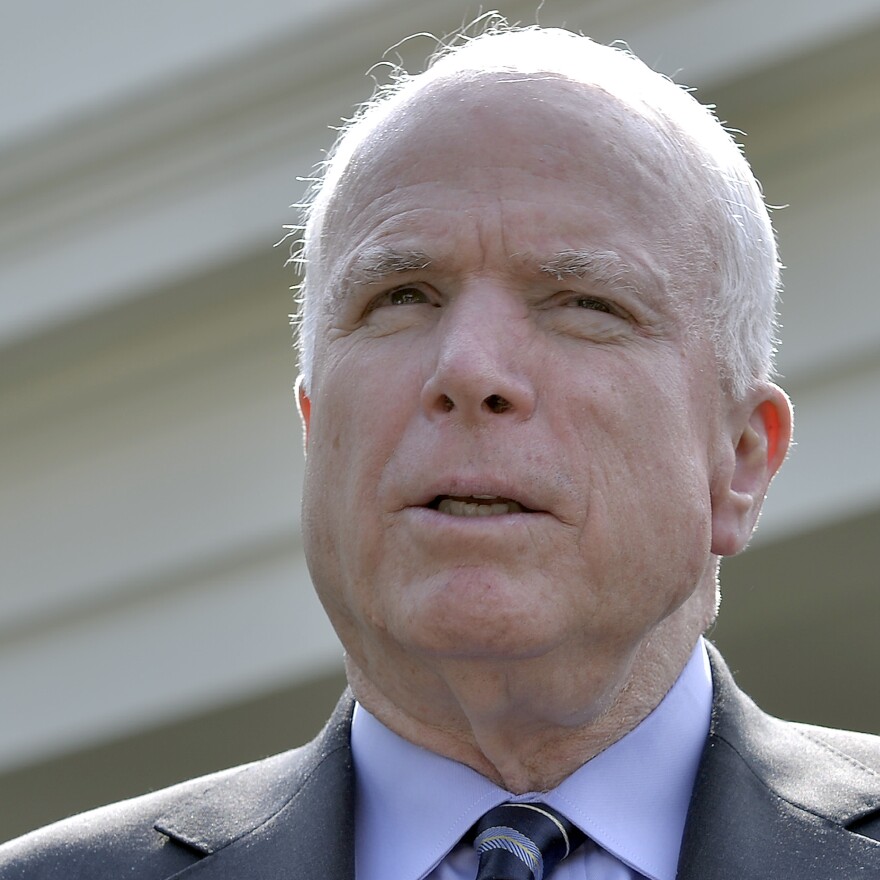In a stinging response to Russian President Vladimir Putin's put-down of "American exceptionalism," Arizona Sen. John McCain told Russians Thursday that Putin "doesn't believe in you."
"He doesn't believe that human nature at liberty can rise above its weaknesses and build just, peaceful, prosperous societies," McCain writes in an op-ed posted by Pravda. "Or, at least, he doesn't believe Russians can. So he rules by using those weaknesses, by corruption, repression and violence. He rules for himself, not you."
McCain, the 2008 Republican presidential nominee, is answering Putin's Sept. 11 op-ed in The New York Times.
In that piece, as we reported, Putin "made an unusual and direct appeal to the American people ... to reject President Obama's calls for possible use of force against Syria."
The Russian leader ended his message with this statement:
"My working and personal relationship with President Obama is marked by growing trust. I appreciate this. I carefully studied his address to the nation on Tuesday. And I would rather disagree with a case he made on American exceptionalism, stating that the United States' policy is 'what makes America different. It's what makes us exceptional.' It is extremely dangerous to encourage people to see themselves as exceptional, whatever the motivation. There are big countries and small countries, rich and poor, those with long democratic traditions and those still finding their way to democracy. Their policies differ, too. We are all different, but when we ask for the Lord's blessings, we must not forget that God created us equal."
Putin's dismissal of "American exceptionalism" angered many U.S. lawmakers.
In his Prava commentary, McCain:
-- Begins by saying, " I am not anti-Russian. I am pro-Russian, more pro-Russian than the regime that misrules you today."
-- Says that "I believe the Russian people, no less than Americans, are endowed by our Creator with inalienable rights to life, liberty and the pursuit of happiness."
-- Writes that "President Putin and his associates do not believe in these values. They don't respect your dignity or accept your authority over them. They punish dissent and imprison opponents. They rig your elections. They control your media. They harass, threaten, and banish organizations that defend your right to self-governance."
-- Criticizes Putin for "allying Russia with some of the world's most offensive and threatening tyrannies."
-- Tells Russians that "I do believe in you. I believe in your capacity for self-government and your desire for justice and opportunity. I believe in the greatness of the Russian people, who suffered enormously and fought bravely against terrible adversity to save your nation. I believe in your right to make a civilization worthy of your dreams and sacrifices. When I criticize your government, it is not because I am anti-Russian. It is because I believe you deserve a government that believes in you and answers to you. And, I long for the day when you have it."
NPR Moscow correspondent Corey Flintoff reminds us that Pravda "is part of the officially sanctioned opposition, so it has Kremlin approval." But neither Pravda's website nor its print version are widely read in Russia, he adds.
Copyright 2020 NPR. To see more, visit https://www.npr.org.



